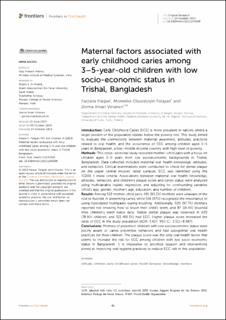| dc.description.abstract | Introduction: Early Childhood Caries (ECC) is more prevalent in nations where a larger portion of the population resides below the poverty line. This study aimed to evaluate the connections between maternal awareness, attitudes, practices related to oral health, and the occurrence of ECC among children aged 3–5 years in Bangladesh, a low–middle income country with high level of poverty.
Methods: This cross–sectional study recruited mother–child pairs with a focus on children aged 3–5 years from low socioeconomic backgrounds in Trishal, Bangladesh. Data collected included maternal oral health knowledge, attitudes, and behaviors. Clinical examinations were conducted to check for dental plaque on the upper central incisors' labial surfaces. ECC was identified using the ICDAS II index criteria. Associations between maternal oral health knowledge, attitudes, behaviors, and children's plaque score and caries status were analyzed using multivariable logistic regression, and adjusting for confounding variables (child's age, gender, mother's age, education, and number of children).
Results: Among 532 mother-child pairs, 491 (93.2%) mothers were unaware of the role of fluoride in preventing caries, while 516 (97%) recognized the importance of using fluoridated toothpaste during brushing. Additionally, 520 (97.7%) mothers reported not knowing how to brush their child's teeth, and 87 (16.4%) brushed their children's teeth twice daily. Visible dental plaque was observed in 420 (78.9%) children, and 321 (60.3%) had ECC. Higher plaque score increased the odds of ECC in the study population (AOR: 5.617, 95% CI: 3.511–8.987).
Conclusions: Mothers of preschool children with low socioeconomic status were poorly aware of caries preventive behaviors and had suboptimal oral health practices for their children. The plaque score was the only oral health factor that seems to increase the risk for ECC among children with low socio-economic status in Bangladesh. It is imperative to prioritize support and interventions aimed at improving oral hygiene practices to reduce ECC risk in this population. | en_US |

